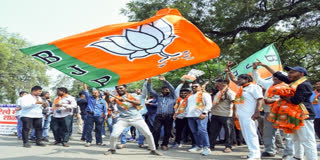New Delhi: The Indian market for cigarettes has been estimated at around 12.8 billion US dollars in 2022, which is expected to grow by four to five per cent per year for the next four-to-five years. A sizable number of these cigarettes are sold by retailers as a single cigarette or in loose form and not in packs as a large number of smokers buy them over the counter to the nearest shop.
Despite the sale of single cigarettes being commonplace across the country, it is completely illegal for anyone to produce, supply or distribute cigarettes without packing which bear a clearly specified warning on the label. The issue was recently raised in Parliament when two members of the Lok Sabha, Feroze Varun Gandhi and Imtiaz Jaleel sought to know from the Health Minister about the legal provisions in this regard.
In response to a question in the Lok Sabha by these two members, SP Singh Baghel, Minister of State for Health and Family Welfare, informed the House that as per the legal provisions no person can produce, supply or distribute cigarettes without clear statutory warning visible on the pack. “As per Section 7 of Cigarettes and Other Tobacco Products (Prohibition of Advertisement and Regulation of Trade and Commerce, Production, Supply and Distribution) Act, 2003 (COTPA, 2003), no person shall produce, supply or distribute cigarettes, unless every package of cigarettes bears on its label, the specified warning,” the Minister informed the Lok Sabha.
Also read: Canada to become 1st country to put health warnings on individual cigarettes
It is clear that in the case of the sale of loose cigarettes or single cigarettes, the buyer is most often not exposed to the specified warning that consumption of tobacco is injurious to health. Moreover, the sale of single cigarettes also makes it easier for smokers with less financial resources to procure cigarettes easily, which makes quitting smoking difficult.
The responsibility lies with states and UTs
Talking about the counter measures to check the sale of loose cigarettes and single cigarettes, the Minister said the responsibility to enforce the COTPA Act of 2003 lies with the State governments and Union Territories. “Public health is a state subject and the primary responsibility for enforcement of the Act, lies with the State governments for effective implementation of the provisions of COTPA, 2003,” the Minister told the Lok Sabha. Baghel said several states and Union Territories had issued orders under Section 7 of the COTPA of 2003 to ban the sale of loose cigarettes and loose tobacco and beedi.
Demographics of tobacco smokers
As per the information available on Statista (www.statista.com), nearly half of the smokers are in the age group of 25-34 years as 46.8 per cent of smokers belong to this age group. People in the age group of 35-44 years form the second largest user base for cigarettes with nearly 32 percent of users belonging to this age group.
Surprisingly enough, young people in the age group of 18-24 years form the third largest user group of cigarettes as 15 per cent of smokers belong to this age group. While only 5.5 per cent of smokers belong to the 45-54 years age group and less than one per cent of smokers belong to the 55-64 years age group.
Strengthening the law
The government said in order to strengthen further the provisions of the COTPA of 2003, the draft Cigarettes and Other Tobacco Products (Prohibition of Advertisement and Regulation of Trade and Commerce, Production, Supply and Distribution) Amendment) Bill of 2020, was hosted in the public domain for pre-legislative consultation.







